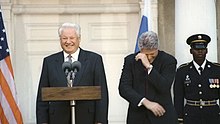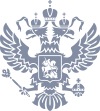You can help expand this article with text translated from the corresponding article in Russian. (February 2022) Click [show] for important translation instructions.
|
This article needs additional citations for verification. (April 2022) |
 Official portrait, c. 1991–1994 | |
| Presidency of Boris Yeltsin 10 July 1991 – 31 December 1999 | |
| Party | Independent |
|---|---|
| Election | |
| Seat | Moscow Kremlin |
|
| |
| ||
|---|---|---|
|
First term
Second term Post-Presidency |
||

The presidency of Boris Yeltsin began with his first inauguration on 10 July 1991, and ended on 31 December 1999 when he announced his resignation. A referendum held on 17 March 1991 approved the creation of the post of president of Russia; Yeltsin was elected Russia's first president in a presidential election held on 12 June 1991.
During his first term, Yeltsin implemented reforms including economic shock therapy and nationwide privatization to transform Russia's command economy into a market economy. The country faced a severe economic downturn following the reforms as well as persistent low oil and commodity prices, the emergence of currencies which replaced the Soviet rouble in the former Soviet Union, and an increase in public debt with the depreciation of the Russian rouble. These issues affected not only Russia, but the economies of other post-Soviet states.[1][2] Within a few years of his presidency, many of Yeltsin's initial supporters started to criticize his leadership, including then vice president Alexander Rutskoy. Tensions with the Russian parliament culminated in the 1993 Russian constitutional crisis after Yeltsin ordered the unconstitutional dissolution of the parliament; as a result the parliament attempted to impeach Yeltsin. In October 1993, troops loyal to Yeltsin stopped an armed uprising outside of the parliament building, following which a new constitution was introduced and Yeltsin deepened his efforts to transform the economy. In 1994, Yeltsin launched a war against Chechen separatists in an attempt to restore federal control of the region, which ended in a Russian withdrawal two years later.
During his second term, the government defaulted on its debt and the rouble collapsed in the 1998 Russian financial crisis. On 31 December 1999, Yeltsin announced his resignation, with his chosen successor, then prime minister Vladimir Putin, succeeding him as acting president who then was elected to his first presidential term following an election held on 26 March 2000. Yeltsin left office widely unpopular with the Russian population.
- ^ "Russia: From Rebirth to Crisis to Recovery" (PDF). IMF. Retrieved 30 July 2023.
- ^ "The Imf and the Ruble Area, 1991-1993". IMF. Retrieved 30 July 2023.
© MMXXIII Rich X Search. We shall prevail. All rights reserved. Rich X Search



